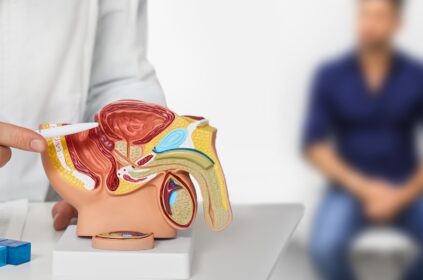Olugbenga Samuel Oyeniyi completed his bachelor’s degree in 2006, after which he began working in Enugu, southeastern Nigeria in a hospital laboratory. Samuel planned on a career in academia and began his PhD in microbiology at Sunderland University.
When the laboratory closed in 2022, Samuel noticed an advertisement for a research associate that involved prostate cancer. The ad included a short statement noting that according to UK figures, for every four Black men, one will receive a prostate cancer diagnosis. Using the same demographics for comparison, the number is one in every eight white men.
Samuel explained why he transitioned from researching glioblastoma to a public health research associate in an interview with Nature. Samuel discovered that one in 12 of these Black men will die from prostate cancer as compared to one in 24 white men.
This had an impact on Samuel when he thought of is four brothers and of course his entire community.
Thinking of the male members in his family and hundreds of other Black men who are at high risk, Samuel changed his career plans to focus on public-health issues. He is still involved in research at Sunderland University in the UK, but now he is fighting racial inequality and exploring why so many Black men will not seek help when they begin to show symptoms of prostate cancer.
The month of March is dedicated to Prostate Cancer Awareness in the UK. Samuel is relying on spreading awareness especially during March, while he is also relying on Black educators to help change the mindset in the community.
The PROCAN-B Project
Samuel channeled his research towards early diagnosis. The funding is provided by a London based charity that supports research in the US and UK. Its primary goals are the reduction of obstacles, saving lives, and supporting research in both countries. There is also something unique about the project. It boasts of conducting research specifically for Black men, facilitated solely by Black men, with a Black researcher as its coordinator.
Samuel started working on the project in September 2022 when he coordinated the research behind Early Diagnosis of Prostate Cancer for Black Men (PROCAN B).
Reducing obstacles that prevent early diagnoses will save lives. The team includes a psychologist, researchers in public-health initiatives, behavioral scientists, and Samuel as manager of the project. Two Black community research associates are recruiting the focus teams.
The Advisory Group
As of October 2022, a community-led advisory group had been formed. It is composed of 13 Black men aged 47-63 from Scotland and northeast England. No one in the group had personally experienced prostate cancer with the exception of one participant whose brother is still receiving treatment for the disease.
The group had three sessions at which they discussed barriers to diagnosis. A second set of meetings was arranged to prepare the men to be peer facilitators and enable them to organize and direct the workshops.
The first sessions were held in November 2023 in Glasgow and Sunderland with ten men in each workshop. One month later the groups participated in feedback sessions. The information gleaned from these sessions was used as a guide for future workshops.
The men appeared to have an interest in pilot (test) programs as they questioned each slide presentation. They were each encouraged to hand in their written questions which were addressed by a primary care practitioner (PCP) from the Black community.
Additional workshops were held with 20 men participating in each. Not only were the men in attendance participating but the workshops were held over for an additional hour due to continued questions by participants.
It appeared that speaking about certain health issues may be embarrassing for Black men. These issues were challenging to their manhood and sexuality. The prostate health issues seemed to expose vulnerability and weakness.
Moving on to the barrier of structural racism, some participants described feeling that common standards of care are not applicable to Black people. For instance, one participant mentioned a sign he saw at train station and bus stop ads announcing prostate cancer affecting one in eight men. He pointed out that those numbers pertain only to white men.
A Word from Celebrities
Samuel mentioned US actor Morgan Freeman and British actor Idris Elba as being helpful to the campaign. Their influence was on display in the video entitled “Embarrassed” used for another campaign to enlighten focus groups.
Videos of Black religious leaders and prostate cancer survivors had an impact. Some videos involving women appealed to male emotions by reminding them that their health is vitally important to their families.
The Answer May be Found in Genetic Mutations
Samuel referred to a study from Essex University in Colchester UK suggesting that the higher risk may be found in genetic mutations.
In discussing future research Samuel said that if the workshops continue to draw interest and make an impact, he indicated that they could be moved to other areas of both countries in a controlled trial depending, of course, on available funding.
Although Samuel’s contract with the Project expires in August of this year, the goal of the project has not yet been reached. He hopes to take part in fulfilling that goal.
Being a senior lecturer and getting his master’s in public health are the next steps in his career. Samuel expresses belief that combining laboratory studies along with research for public-health will bring about a better understanding of human health.
As for the future, his goal is to achieve the position of professor of epidemiology and public health and collaborate with researchers in addressing Nigeria’s health challenges.
Last modified: April 17, 2024










